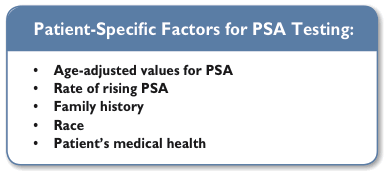|
Should I Have a PSA Test?Josiah D. Nelson, MD Prostate cancer is the second leading cause of cancer death in men, with an estimated 32,000 men dying last year. The Prostate-Specific Antigen (PSA) blood test has long been used by many physicians as one of the indicators for prostate cancer risk. Some estimates suggest that use of PSA screening saved 24,000 lives last year alone. The American Urological Association (AUA), American Cancer Society and National Comprehensive Cancer Network all recommend making an informed decision on whether to undergo PSA screening. The general recommendation by these organizations is to begin PSA screening in men between the ages of 40 and 50 years with at least a 10-year life expectancy. In recent months, there has been much media attention given to the use of PSA screening based on a draft proposal released by the United States Preventative Services Task Force (USPSTF). The USPSTF’s recommendations for PSA screening contradict recommendations from the above medically-respected organizations.
Consideration of your family history, race and overall medical health are used in determining prostate cancer risk. Finally, as urologists, we educate patients with less aggressive prostate cancers on the use of active surveillance as a method to monitor cancer without definitive treatment. These patient-specific factors as well as reputable prostate cancer studies support the continued use of PSA screening in the detection of prostate cancer. Ultimately, generalized statements about whether or not to use the PSA test in the diagnosis and treatment of prostate cancer must be carefully weighed against patient-specific factors such as those described above. In addition, PSA testing should be performed in conjunction with a prostate examination by your physician. The physician will incorporate information from previous prostate examinations and PSA tests and examine the clinical data for changes in the PSA or prostate examination over time. Using this data and your specific risk factors, the physician will make a recommendation for additional testing, including prostate biopsies, based on the individual patient.
Dr. Josiah Nelson & Dr. Michael Hirsh – Western Wisconsin Urology |





 Prostate cancer has no symptoms until it has spread, thus the need for screening to detect cancer early, when it is treatable. Since the 1990’s when PSA screening became widely used,
there has been a 35% decline in the peak death rate from prostate cancer. With early detection, the five year survival rate for men with localized prostate cancer nears 100%. However, the five-year survival rate for men with metastatic prostate cancer is only 30%. Based on current medical data and our experience with prostate cancer patients, we at Western Wisconsin Urology continue to support the use of PSA to screen asymptomatic men 40 years and older with a life expectancy of at least 10 years.
You should discuss your individual risk for prostate cancer with your physician. For more information, contact Western
Wisconsin Urology at 715-835-6548.
Prostate cancer has no symptoms until it has spread, thus the need for screening to detect cancer early, when it is treatable. Since the 1990’s when PSA screening became widely used,
there has been a 35% decline in the peak death rate from prostate cancer. With early detection, the five year survival rate for men with localized prostate cancer nears 100%. However, the five-year survival rate for men with metastatic prostate cancer is only 30%. Based on current medical data and our experience with prostate cancer patients, we at Western Wisconsin Urology continue to support the use of PSA to screen asymptomatic men 40 years and older with a life expectancy of at least 10 years.
You should discuss your individual risk for prostate cancer with your physician. For more information, contact Western
Wisconsin Urology at 715-835-6548.